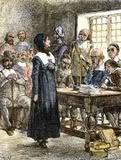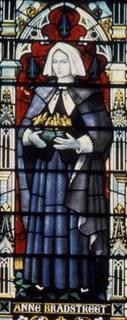Civil War Nurse and Feminist During the Civil War, Mary Livermore organized a volunteer support network for the Union hospitals, wrote letters for wounded soldiers, escorted wounded soldiers from hospitals to their homes, and raised large sums of money to support the work of the U.S. Sanitary Commission. Livermore worked closely with Mary Ann Bickerdyke who was chief of nursing under the command of General Ulysses S. Grant and General William T. Sherman during the Atlanta Campaign. Mary Ashton Rice was born in Boston on December 19, 1820, into a strict Calvinist Baptist family, took religious questions seriously as a child. She liked to pretend to be a preacher, using the kitchen table as her pulpit, and if she could…
Category: Feminists

Anne Hutchinson
Women in Religion: Early American Religious Leader Image: Hutchinson On Trial Puritan leaders called Anne Hutchinson and her supporters Antinomians—individuals opposed to the rule of law. Puritans saw her as a challenge to their male-dominated society. Tried for sedition, she was also exiled as a danger to the colony. She lived in Rhode Island for a time and then moved to New Amsterdam, where she was killed in 1643 during a conflict between settlers and Native Americans. Anne Marbury was born in Alford England, in July 1591, the daughter of Francis Marbury, a deacon at Christ Church in Cambridge. Anne’s father believed that most of the ministers in the Church of England hadn’t received the proper training for their position,…

Anne Bradstreet
First American Poet Anne Bradstreet was the first American poet, and her first collection of poems was the first book written by a woman to be published in the United States. Her work serves as a testament to the struggles of a Puritan wife against the hardships of New England colonial life. Image: Anne Bradstreet Stained Glass Window St. Botolph’s Church in Boston, England Anne Dudley was born in Northampton, England, in the year 1612, daughter of Thomas Dudley, an earl’s estate manager. Anne was unusually well educated for her time – tutored in history, several languages, and literature.
Clarina Nichols
Women’s Rights Activist and Journalist Clarina Nichols (1810–1885) was a journalist and newspaper editor who was involved in all three of the major reform movements of the mid-19th century: temperance, abolition and women’s rights. Because of her own experiences, Nichols was one of the first to grasp the importance of economic rights for women, of the need for wives to keep their property and wages away from their husbands’ control. Clarina Irene Howard was born January 25, 1810, in West Townshend, Vermont, into a prosperous New England family. She was the oldest of eight children, and received an above average education for her day. Her father was the town’s ‘overseer of the poor.’ Clarina listened to his interviews with poor…
Sarah Grimke
One of the First Social Reformers in the United States Sarah Moore Grimke, the lesser known of the Grimke sisters, was born November 26, 1792, in Charleston, South Carolina, the daughter of Judge John Grimke. Sarah was a writer, an abolitionist and an early advocate of women’s rights. At five years old, she saw a slave being whipped and tried to board a steamship that could take her to a place where there was no slavery. The Grimkes lived alternately between a fashionable townhouse in Charleston and a thriving cotton plantation in Beaufort with hundreds of slaves. Judge Grimke was the Chief Justice of the South Carolina Supreme Court. He was a strong advocate of slavery and of the subordination…
Anna Dickinson
Abolitionist and Lecturer during the Civil War Anna Elizabeth Dickinson was an abolitionist, writer, lecturer and advocate for women’s rights. A gifted speaker at a very young age, she significantly influenced the distribution of political power in the Union just prior to the Civil War. She helped the Republican Party gain key positions in the hard-fought election campaigns of 1863, and was the first woman to speak before the U.S. Congress. Childhood Anna Elizabeth Dickinson was born in Philadelphia on October 28, 1842, the youngest of five children of Quaker parents. Her father was a dedicated abolitionist who died of a heart attack shortly after giving a fiery antislavery speech in 1844. Since Anna was only two years old, she…
Abby Kelley
One of the First Feminists in the United States Abby Kelley (1811–1887) was a Quaker abolitionist and radical social reformer active from the 1830s to 1870s. She became a fundraiser, lecturer and committee organizer for the influential American Anti-Slavery Society. Fighting for equal rights for women soon became a new priority for many ultra abolitionists and Kelley was among them, speaking on women’s rights in Seneca Falls, New York five years before the first Women’s Rights Convention would be held there. Image: Abby Kelley Charlotte Wharton, Artist Abigail Kelley was born on January 15, 1811, in Pelham, Massachusetts. She was quite delicate as a child, and her family encouraged her to spend time outdoors. She helped her father around the…
Sojourner Truth and The Civil War
African American Abolitionist and Women’s Rights Activist Sojourner Truth was a nationally known feminist and social reformer. During the Civil War, she helped recruit black soldiers for the Union Army. After the war, she tried to secure land grants from the federal government for former slaves, a project she pursued for seven years, meeting with President Ulysses S. Grant to discuss the subject. Image: Sojourner Truth Monument Florence, Massachusetts Truth lived in Florence (a village of Northampton) from 1843-1857. She came to Florence to join the Northampton Association of Education and Industry, a utopian community dedicated to equality and justice. After the Association disbanded, she remained in Florence, bought her first home, dictated her autobiography to Olive Gilbert and became…
Lucy Stone
One of the First Feminists in the United States Lucy Stone (1818–1893) was a prominent American abolitionist and suffragist, and a tireless advocate of rights for women. She began her career in social reform by speaking out against slavery at a time when women were discouraged and prevented from public speaking. She was a pioneer in the women’s rights movement, addressing several legislative bodies and urging them to pass laws giving more rights to women. Stone was also the first recorded American woman to keep her maiden name after marriage. Lucy Stone was born near West Brookfield, Massachusetts, on August 13, 1818. As a young girl, Lucy noticed that her mother was totally dependent on her father, even having to…
Women’s Rights Before the Civil War
The Struggle for Women’s Rights Begins In Colonial America and the first few decades of the new United States, individual women often fought for equal rights for themselves, such as assuming business interests of a husband after his death. During the war for independence women did their part by supporting the Patriots in numerous ways, including organizing boycotts of British goods. In the 18th and 19th centuries, American law was based upon English common law and the doctrine of coverture, which stated that a woman’s legal rights were incorporated into those of her husband when she married, and she was not recognized as having rights and obligations distinct from those of her husband. One of the few legal advantages of…